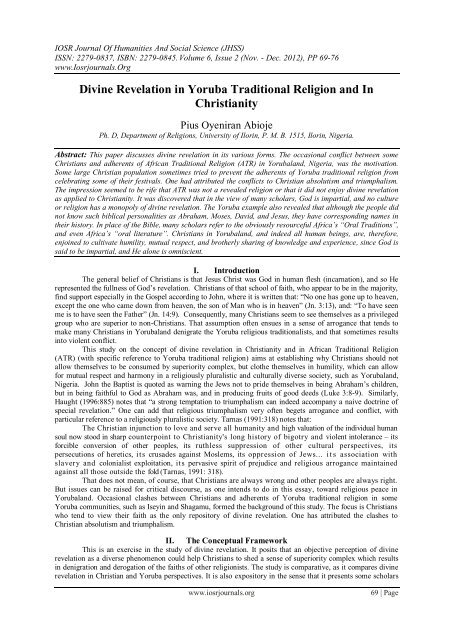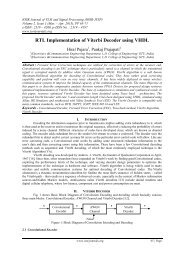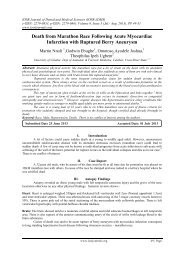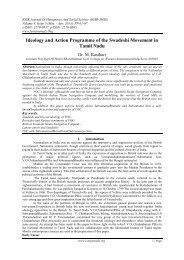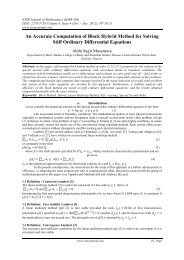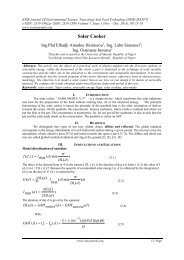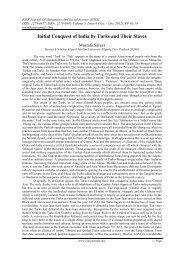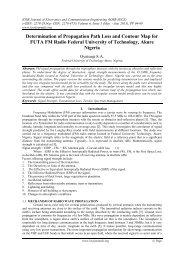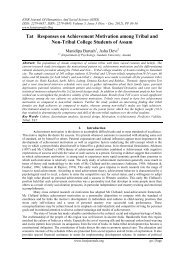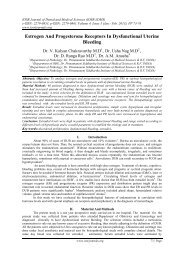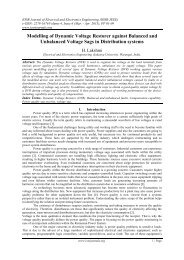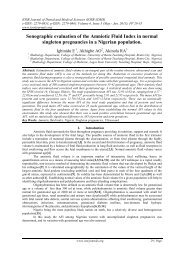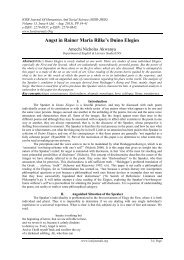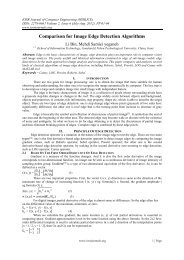Design Compatibility of Classroom Furniture in Urban and ... - IOSR
Design Compatibility of Classroom Furniture in Urban and ... - IOSR
Design Compatibility of Classroom Furniture in Urban and ... - IOSR
You also want an ePaper? Increase the reach of your titles
YUMPU automatically turns print PDFs into web optimized ePapers that Google loves.
<strong>IOSR</strong> Journal Of Humanities And Social Science (JHSS)<br />
ISSN: 2279-0837, ISBN: 2279-0845. Volume 6, Issue 2 (Nov. - Dec. 2012), PP 69-76<br />
www.Iosrjournals.Org<br />
Div<strong>in</strong>e Revelation <strong>in</strong> Yoruba Traditional Religion <strong>and</strong> In<br />
Christianity<br />
Pius Oyeniran Abioje<br />
Ph. D, Department <strong>of</strong> Religions, University <strong>of</strong> Ilor<strong>in</strong>, P. M. B. 1515, Ilor<strong>in</strong>, Nigeria.<br />
Abstract: This paper discusses div<strong>in</strong>e revelation <strong>in</strong> its various forms. The occasional conflict between some<br />
Christians <strong>and</strong> adherents <strong>of</strong> African Traditional Religion (ATR) <strong>in</strong> Yorubal<strong>and</strong>, Nigeria, was the motivation.<br />
Some large Christian population sometimes tried to prevent the adherents <strong>of</strong> Yoruba traditional religion from<br />
celebrat<strong>in</strong>g some <strong>of</strong> their festivals. One had attributed the conflicts to Christian absolutism <strong>and</strong> triumphalism.<br />
The impression seemed to be rife that ATR was not a revealed religion or that it did not enjoy div<strong>in</strong>e revelation<br />
as applied to Christianity. It was discovered that <strong>in</strong> the view <strong>of</strong> many scholars, God is impartial, <strong>and</strong> no culture<br />
or religion has a monopoly <strong>of</strong> div<strong>in</strong>e revelation. The Yoruba example also revealed that although the people did<br />
not know such biblical personalities as Abraham, Moses, David, <strong>and</strong> Jesus, they have correspond<strong>in</strong>g names <strong>in</strong><br />
their history. In place <strong>of</strong> the Bible, many scholars refer to the obviously resourceful Africa’s “Oral Traditions”,<br />
<strong>and</strong> even Africa’s “oral literature”. Christians <strong>in</strong> Yorubal<strong>and</strong>, <strong>and</strong> <strong>in</strong>deed all human be<strong>in</strong>gs, are, therefore,<br />
enjo<strong>in</strong>ed to cultivate humility, mutual respect, <strong>and</strong> brotherly shar<strong>in</strong>g <strong>of</strong> knowledge <strong>and</strong> experience, s<strong>in</strong>ce God is<br />
said to be impartial, <strong>and</strong> He alone is omniscient.<br />
I. Introduction<br />
The general belief <strong>of</strong> Christians is that Jesus Christ was God <strong>in</strong> human flesh (<strong>in</strong>carnation), <strong>and</strong> so He<br />
represented the fullness <strong>of</strong> God‟s revelation. Christians <strong>of</strong> that school <strong>of</strong> faith, who appear to be <strong>in</strong> the majority,<br />
f<strong>in</strong>d support especially <strong>in</strong> the Gospel accord<strong>in</strong>g to John, where it is written that: “No one has gone up to heaven,<br />
except the one who came down from heaven, the son <strong>of</strong> Man who is <strong>in</strong> heaven” (Jn. 3:13), <strong>and</strong>: “To have seen<br />
me is to have seen the Father” (Jn. 14:9). Consequently, many Christians seem to see themselves as a privileged<br />
group who are superior to non-Christians. That assumption <strong>of</strong>ten ensues <strong>in</strong> a sense <strong>of</strong> arrogance that tends to<br />
make many Christians <strong>in</strong> Yorubal<strong>and</strong> denigrate the Yoruba religious traditionalists, <strong>and</strong> that sometimes results<br />
<strong>in</strong>to violent conflict.<br />
This study on the concept <strong>of</strong> div<strong>in</strong>e revelation <strong>in</strong> Christianity <strong>and</strong> <strong>in</strong> African Traditional Religion<br />
(ATR) (with specific reference to Yoruba traditional religion) aims at establish<strong>in</strong>g why Christians should not<br />
allow themselves to be consumed by superiority complex, but clothe themselves <strong>in</strong> humility, which can allow<br />
for mutual respect <strong>and</strong> harmony <strong>in</strong> a religiously pluralistic <strong>and</strong> culturally diverse society, such as Yorubal<strong>and</strong>,<br />
Nigeria. John the Baptist is quoted as warn<strong>in</strong>g the Jews not to pride themselves <strong>in</strong> be<strong>in</strong>g Abraham‟s children,<br />
but <strong>in</strong> be<strong>in</strong>g faithful to God as Abraham was, <strong>and</strong> <strong>in</strong> produc<strong>in</strong>g fruits <strong>of</strong> good deeds (Luke 3:8-9). Similarly,<br />
Haught (1996:885) notes that “a strong temptation to triumphalism can <strong>in</strong>deed accompany a naive doctr<strong>in</strong>e <strong>of</strong><br />
special revelation.” One can add that religious triumphalism very <strong>of</strong>ten begets arrogance <strong>and</strong> conflict, with<br />
particular reference to a religiously pluralistic society. Tarnas (1991:318) notes that:<br />
The Christian <strong>in</strong>junction to love <strong>and</strong> serve all humanity <strong>and</strong> high valuation <strong>of</strong> the <strong>in</strong>dividual human<br />
soul now stood <strong>in</strong> sharp counterpo<strong>in</strong>t to Christianity's long history <strong>of</strong> bigotry <strong>and</strong> violent <strong>in</strong>tolerance – its<br />
forcible conversion <strong>of</strong> other peoples, its ruthless suppression <strong>of</strong> other cultural perspectives, its<br />
persecutions <strong>of</strong> heretics, its crusades aga<strong>in</strong>st Moslems, its oppression <strong>of</strong> Jews... i t s association with<br />
slavery <strong>and</strong> colonialist exploitation, its pervasive spirit <strong>of</strong> prejudice <strong>and</strong> religious arrogance ma<strong>in</strong>ta<strong>in</strong>ed<br />
aga<strong>in</strong>st all those outside the fold (Tarnas, 1991: 318).<br />
That does not mean, <strong>of</strong> course, that Christians are always wrong <strong>and</strong> other peoples are always right.<br />
But issues can be raised for critical discourse, as one <strong>in</strong>tends to do <strong>in</strong> this essay, toward religious peace <strong>in</strong><br />
Yorubal<strong>and</strong>. Occasional clashes between Christians <strong>and</strong> adherents <strong>of</strong> Yoruba traditional religion <strong>in</strong> some<br />
Yoruba communities, such as Isey<strong>in</strong> <strong>and</strong> Shagamu, formed the background <strong>of</strong> this study. The focus is Christians<br />
who tend to view their faith as the only repository <strong>of</strong> div<strong>in</strong>e revelation. One has attributed the clashes to<br />
Christian absolutism <strong>and</strong> triumphalism.<br />
II. The Conceptual Framework<br />
This is an exercise <strong>in</strong> the study <strong>of</strong> div<strong>in</strong>e revelation. It posits that an objective perception <strong>of</strong> div<strong>in</strong>e<br />
revelation as a diverse phenomenon could help Christians to shed a sense <strong>of</strong> superiority complex which results<br />
<strong>in</strong> denigration <strong>and</strong> derogation <strong>of</strong> the faiths <strong>of</strong> other religionists. The study is comparative, as it compares div<strong>in</strong>e<br />
revelation <strong>in</strong> Christian <strong>and</strong> Yoruba perspectives. It is also expository <strong>in</strong> the sense that it presents some scholars<br />
www.iosrjournals.org<br />
69 | Page


